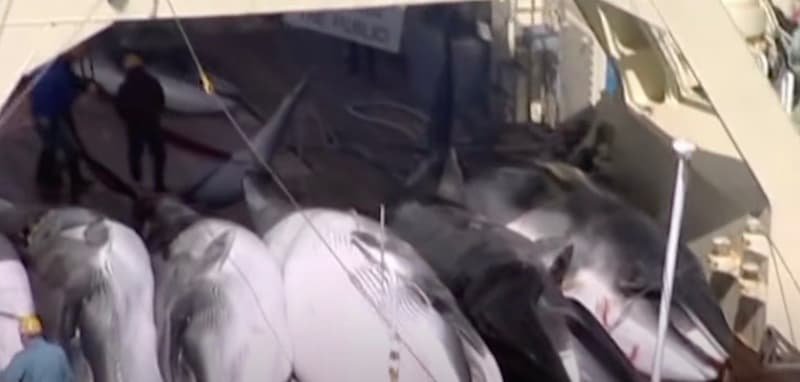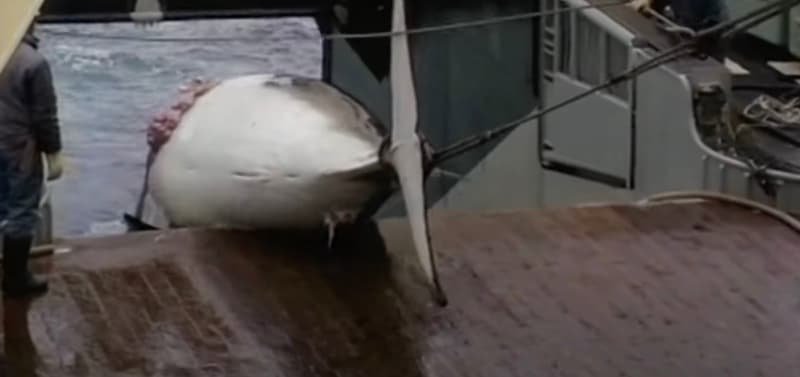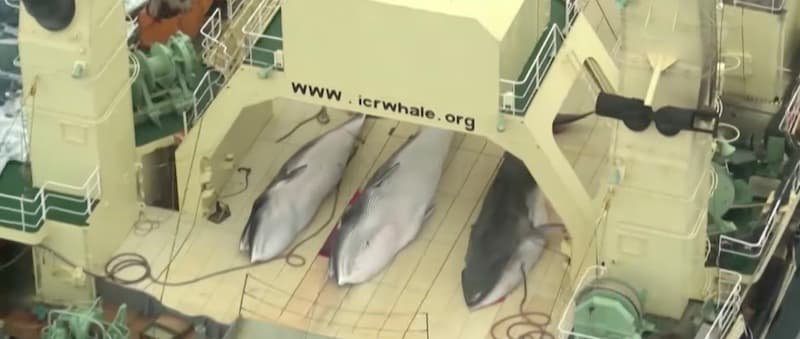
 Olivia Møller
Freediver - Activist - Explorer
Olivia Møller
Freediver - Activist - Explorer

 Olivia Møller
Freediver - Activist - Explorer
Olivia Møller
Freediver - Activist - Explorer
Our exploration into Iceland's polarizing whaling practices unfolds, weaving together threads of history, ecological impact, and the contemporary choices faced by the nation. In the initial segment, we examined the historical roots of Icelandic whaling, tracing its evolution from a survival necessity to a contentious modern-day industry. Now, as we transition, the focus shifts to the ecological repercussions of Iceland's continued whaling, international criticism and the use of technology.
The issue of whaling in Iceland has stirred international criticism and raised questions about the nation's commitment to global conservation efforts. Despite the imposition of whaling moratoriums by international bodies such as the International Whaling Commission (IWC), Iceland has consistently defied these measures, leading to strained relations with the international community and exacerbating the debate on the ethics and sustainability of its whaling practices.
The imposition of a whaling moratorium by the IWC in 1986 marked a significant step towards the conservation of endangered whale species. The moratorium aimed to allow whale populations to recover from decades of overexploitation. While many nations adhered to this global consensus, Iceland chose to withdraw from the IWC in 1992, resuming commercial whaling independently. This decision immediately sparked international criticism and condemnation.
Iceland's decision to resume commercial whaling strained its diplomatic relations with other nations, particularly those committed to the preservation of marine life. Environmental organizations, as well as individual countries, voiced their concerns over Iceland's defiance of international agreements, leading to diplomatic tensions. The rifts created by Iceland's actions have implications for broader international cooperation on environmental issues.
The European Union (EU) has been particularly vocal in expressing its disapproval of Iceland's whaling practices. Iceland's aspirations for EU membership faced setbacks, with the EU tying accession negotiations to a commitment to ceasing whaling activities. This linkage underscores the significance of aligning with international norms on conservation and reflects the broader consequences of Iceland's stance on its global standing.

Numerous environmental organizations, both domestic and international, have actively campaigned against Iceland's resumption of commercial whaling. These organizations leverage public awareness campaigns, legal challenges, and advocacy initiatives to bring attention to the environmental consequences of whaling and the need for Iceland to align with international conservation efforts.
The international community, including citizens from across the globe, has increasingly expressed its concern over Iceland's defiance of whaling moratoriums. Social media campaigns, petitions, and protests have amplified public outcry against the continuation of whaling. This global mobilization underscores the power of public opinion in influencing government policies and fostering a sense of social responsibility towards the preservation of marine life.
Iceland's commitment to environmental sustainability has come under scrutiny due to its stance on whaling. The nation's reputation as a responsible steward of its natural resources is at risk, with potential long-term consequences for its tourism industry and global partnerships. Critics argue that aligning with international norms on whaling is essential for Iceland to maintain its image as a progressive and environmentally conscious nation.
While international criticism prevails, some argue for diplomatic engagement and constructive dialogue as avenues for resolving the issue. Collaborative efforts that involve international organizations, governments, and environmental advocates could provide a platform for addressing Iceland's concerns while fostering a commitment to sustainable practices.

The ethical considerations surrounding Icelandic whaling extend beyond economic and environmental concerns, delving into the realm of animal welfare. As scientific understanding of cetaceans deepens, a growing body of evidence highlights the intelligence, social complexity, and emotional capacity of whales. This section explores the ethical dimensions of whaling, emphasizing the moral imperative for Iceland to cease these practices in light of the well-being and intrinsic value of these remarkable marine mammals.
Scientific research has revealed the remarkable cognitive abilities of whales, challenging traditional perceptions of them as mere commodities. Whales, including those targeted in Icelandic whaling operations such as minke and fin whales, exhibit advanced problem-solving skills, self-awareness, and complex communication patterns. The recognition of these cognitive capacities raises ethical questions about the morality of hunting and killing such sentient beings.
Whales, particularly species like the orca, are known for their intricate social structures and close-knit family bonds. The disruption caused by whaling, which often targets specific age classes or reproductive individuals, can have profound and enduring effects on these social units. The ethical dilemma arises when considering the impact of whaling on the fabric of these societies and the potential for long-term harm to their intricate social structures.

Studies on whale behavior indicate that these marine mammals possess emotional capabilities akin to those of humans and other highly intelligent species. Whales are known to express joy, grief, and distress, and their stress response to activities like whaling is evident through changes in behavior and physiology. The ethical imperative to protect animal welfare extends to minimizing unnecessary harm and stress, making a compelling argument against the continuation of whaling practices.
The evolving understanding of animal sentience places a moral responsibility on humanity to reassess its treatment of sentient beings, including whales. Ethical frameworks centered on compassion, empathy, and the acknowledgment of the intrinsic value of living beings underscore the need for a paradigm shift in human-animal relationships. This moral responsibility advocates for the protection of whales from harm and exploitation.
The international community has witnessed a growing global shift towards recognizing and addressing the ethical treatment of animals. This trend encompasses not only domestic animals but also extends to wildlife, emphasizing the need for ethical considerations in conservation and resource management. The ethical imperative to protect whales aligns with broader societal values that prioritize compassion and respect for all living beings.
Shifting perspectives on whales from consumable resources to non-consumptive sources of value represents an ethical evolution. Whale-watching tourism, for example, allows humans to appreciate and interact with these magnificent creatures without causing harm. The economic viability of such non-consumptive activities demonstrates that ethical alternatives exist, promoting coexistence with whales rather than their exploitation.
Several international agreements and conventions emphasize the importance of animal welfare, recognizing animals as sentient beings deserving of ethical consideration. The World Organisation for Animal Health (OIE) and other global entities have established guidelines and principles for the humane treatment of animals, reinforcing the need for Iceland to align with these ethical standards in its approach to whaling.

As the global community intensifies efforts to protect marine life, technology emerges as a crucial ally in monitoring and enforcing anti-whaling measures. Technological innovations offer the potential to enhance surveillance, gather crucial data, and strengthen enforcement mechanisms, thereby creating a more robust framework for the preservation of whales and marine ecosystems. This section explores the diverse applications of technology in combating whaling and highlights its role in shaping a more effective and proactive approach to conservation.
Satellite technology has revolutionized the tracking and surveillance of vessels engaged in whaling activities. Satellites equipped with advanced imaging capabilities can monitor vessel movements in real-time, enabling authorities to identify and track vessels operating in prohibited areas or violating international regulations. This technology provides a powerful tool for detecting and deterring illegal whaling activities, offering a level of oversight that was previously unattainable.
Advancements in underwater acoustic monitoring contribute significantly to the identification and tracking of whale populations. Hydrophones and underwater listening devices can detect and record whale vocalizations, aiding scientists in population assessments and migration pattern studies. Integrating artificial intelligence (AI) algorithms enhances the ability to identify specific whale species, allowing for more accurate data collection without direct physical intervention.
Unmanned aerial vehicles, or drones, have become instrumental in conducting aerial surveillance over vast expanses of ocean. Drones equipped with high-resolution cameras and sensors can monitor whale populations, observe behaviors, and document vessel activities. This technology not only provides valuable data for scientific research but also acts as a deterrent to illegal whaling, as the presence of drones increases the likelihood of detection.

The Automatic Identification System (AIS) is a vessel tracking system widely used in maritime traffic management. Integrating AIS data into anti-whaling efforts enhances the ability to monitor vessel movements and identify suspicious activities. By cross-referencing AIS data with satellite tracking and surveillance information, authorities can create a comprehensive picture of maritime activities, improving the efficiency of enforcement efforts.
Machine learning algorithms and predictive analytics play a crucial role in processing vast amounts of data generated by technology. By analyzing historical data on vessel movements, whale sightings, and environmental conditions, these technologies can predict potential hotspots for illegal whaling activities. This proactive approach enables enforcement agencies to allocate resources effectively and intervene before violations occur.
Advancements in DNA analysis have proven instrumental in identifying whale species and verifying the origin of whale products in the market. DNA profiling allows scientists to differentiate between species, enabling authorities to enforce regulations on the trade of endangered or protected whales. This technology acts as a deterrent to illegal whaling by creating a traceability system that holds perpetrators accountable for their actions.
Technology facilitates international collaboration by enabling the seamless sharing of information and data among countries and organizations. Platforms that centralize data from various sources, such as satellite imagery, acoustic monitoring, and vessel tracking, create a collaborative environment for combating illegal whaling. This shared information enhances the collective response to potential threats, fostering a united front against illegal and unsustainable practices.